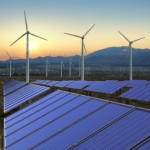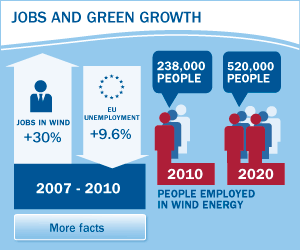 By Manuel Pueyo, EU Sustainable Energy Week
By Manuel Pueyo, EU Sustainable Energy Week
This year we have good reason to expect that a rich range of events for EUSEW will be organised all over Europe. Thousands of organisations and individuals will participate in the EU Sustainable Energy Week (EUSEW) by hosting, attending or collaborating with an Energy Day. Energy Days may take different forms (conferences, open door events, presentations, exhibitions, performances, etc.) but they all have one thing in common: they promote, innovate, and enrich the debate about energy efficiency and renewable energy sources.
Sustainable Energy Week is an initiative of the European Commission that first took place in 2006. It is designed to spread best practices, inspire new ideas and build alliances to help meet the EU’s energy and climate goals. Beginning in 2006 with a single sustainable energy debate in Brussels, EUSEW’s participation has been increasing significantly since then. 73 events took place in 2008 while 328 events were organised in 2010. Last year, 720 activities took place across Europe. continue reading »
 by Stephane Bourgeois, Head of Regulatory Affairs, EWEA
by Stephane Bourgeois, Head of Regulatory Affairs, EWEA
It’s a long and winding road to a post 2020 EU energy policy. Europe faces a policy void after 2020 when the main pillars of EU energy policy – targets for renewable energy, emissions and energy efficiency – run out. At the moment only the Emissions Trading System is set to continue after 2020. What Europe needs if it is to continue increasing its share of renewable energy, with all the economic growth and jobs that can create (as well as reducing our fuel import bill and the obvious environmental and climate benefits), is to put in place for 2030 a policy that works: a legally binding renewable energy target.
But for the second time Poland has blocked Council conclusions on the 2050 Roadmap which is the EU’s attempt to begin to fill that policy void. Today the Polish prevented the Energy Ministers from reaching a formal agreement on the 2050 Energy roadmap, and this follows doing the same last year with Environment Ministers on the overall 2050 Low Carbon Economy Roadmap (which covers energy, transport and other sectors). continue reading »
 Some of the UK’s media is quick to publish anti-wind power stories, so it came as a surprise when this week British papers picked up on a new study by the Grantham Research Institute on Climate Change on onshore wind energy.
Some of the UK’s media is quick to publish anti-wind power stories, so it came as a surprise when this week British papers picked up on a new study by the Grantham Research Institute on Climate Change on onshore wind energy.
The paper entitled, ‘the case for and against onshore wind energy in the UK,’ says that onshore wind energy will be as cheap as fossil fuels by 2016 – just four years away.
continue reading »
 Much has been made of the European Environment Agency (EEA)’s recent report that greenhouse gas emissions increased in 2010. But what is equally as interesting is the key role that renewables including wind played in containing further emissions growth.
Much has been made of the European Environment Agency (EEA)’s recent report that greenhouse gas emissions increased in 2010. But what is equally as interesting is the key role that renewables including wind played in containing further emissions growth.
The EEA reported last week that EU greenhouse gas increased by 2.4 % in 2010 as a result of economic recovery in many countries after the 2009 recession and a colder winter. “This rebound effect was expected as most of Europe came out of recession,” said EEA executive director Jacqueline McGlade. “However, the increase could have been even higher without the fast expansion of renewable energy generation in the EU,” she insisted. continue reading »
 Wind energy was front-page news in the UK this weekend with the revelation that Chancellor of the Exchequer George Osborne plans on cutting subsidies for onshore wind turbines by 25%, a move that would “kill dead” the industry, according to RenewableUK. At the same time, the Chancellor will maintain Government support for nuclear and fossil fuels which account for the largest proportion of Government support for energy.
Wind energy was front-page news in the UK this weekend with the revelation that Chancellor of the Exchequer George Osborne plans on cutting subsidies for onshore wind turbines by 25%, a move that would “kill dead” the industry, according to RenewableUK. At the same time, the Chancellor will maintain Government support for nuclear and fossil fuels which account for the largest proportion of Government support for energy.
The news came despite Prime Minister David Cameron’s election campaign promises to be the “greenest government ever” and in the face of a new poll which reveals that a majority of Britons actually want more wind energy.
continue reading »
 By Manuel Pueyo, EU Sustainable Energy Week
By Manuel Pueyo, EU Sustainable Energy Week









